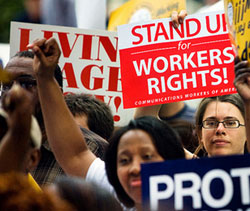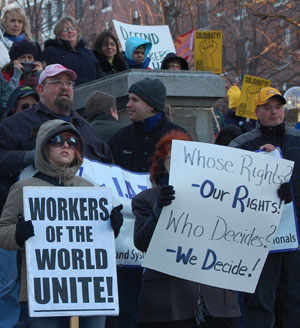State of the Union
• Fight for a New Direction for the Economy that Affirms Workers’ Rights
• Wisconsin: One Million Signatures Show Workers Determined to Block Attacks on Rights
• Indiana: Tens of Thousands Demonstrate Against “Right to be Slave Labor” Law
• Canadian and U.S. Workers Stand as One
• Lockouts and the Reactionary Rebellion of Owners of Monopoly Capital
Fight for a New Direction for the Economy that Affirms Workers’ Rights
 President Barack Obama gave his State of the Union address January 24. As expected, he spoke mainly to the issues of jobs and the economy. He called for “an economy built on American manufacturing, American energy, skills for American workers and a renewal of American values.” As an indication of what he has in mind, he gave General Motors as an example. He defended the government bail out of the Big Three automakers saying, “In exchange for help, we demanded responsibility. We got workers and automakers to settle their differences.” He added, “Today General Motors is back on top as the world’s number-one automaker.” He also provided various proposals to continue paying the rich, including GM, through tax incentives.
President Barack Obama gave his State of the Union address January 24. As expected, he spoke mainly to the issues of jobs and the economy. He called for “an economy built on American manufacturing, American energy, skills for American workers and a renewal of American values.” As an indication of what he has in mind, he gave General Motors as an example. He defended the government bail out of the Big Three automakers saying, “In exchange for help, we demanded responsibility. We got workers and automakers to settle their differences.” He added, “Today General Motors is back on top as the world’s number-one automaker.” He also provided various proposals to continue paying the rich, including GM, through tax incentives.
Workers across the country listening to this plan, including those in Detroit, were likely interested to hear proposals about manufacturing. But they no doubt were equally concerned with the GM model provided. General Motors got a large portion of the $24.9 billion in public dollars given to the Big Three by Obama, with $6 billion alone going to GMAC, GM’s financial arm. GM got another $50 billion after declaring bankruptcy and another $14 billion in longer-term tax (pay GM) breaks.
Far from defending jobs, the government backed GM "restructuring" that included closing 11 factories, laying off thousands while also securing concessions on healthcare and pension benefits. Detroit remains the poorest city in the country with the violence of poverty increasing. Unemployment and home foreclosures remain high. A recent study shows that only 43 percent of working age African American males are working, with the rest unemployed or part of the genocide of mass incarceration.
GM got “on top” on the backs of the workers, who produce the wealth, and the public treasury — meaning it secured not only a greater portion of the value added by the workers at the point of production, but grabbed even more of that value using the government’s pay the rich schemes. Indeed the GM model stands out for demanding that workers submit to the aim of making U.S. monopolies number one in the world and for government to pay the monopolies whatever is needed to achieve this. And pay addiitonal hundreds of billions in public dollars to militarily back up the empire building of these monopolies, including GM, Exxon/Mobil, U.S. Steel and many more.
 Many listening to the speech also had to wonder how it is that Obama completely missed the broad resistance by the workers to defend their rights this past year, an important contribution to the economy and well-being of the people. Wisconsin, Michigan, Ohio, Indiana — industrial states savaged by the broad destruction of manufacturing — all saw workers standing as one to defend their rights and the rights of all. Their struggles gave expression to a different direction for the economy, a new direction that affirms the rights of workers. Their spirit was one of organizing to break new ground, to stand on the shoulders of those who forged the unions and carry forward the fight today for the workers themselves to be decision makers. Whose House, Our House! they declared in statehouses filled with workers. Whose Economy, Our Economy! Whose Rights, Our Rights? Who Decides? We Decide! is the direction the thinking is going in.
Many listening to the speech also had to wonder how it is that Obama completely missed the broad resistance by the workers to defend their rights this past year, an important contribution to the economy and well-being of the people. Wisconsin, Michigan, Ohio, Indiana — industrial states savaged by the broad destruction of manufacturing — all saw workers standing as one to defend their rights and the rights of all. Their struggles gave expression to a different direction for the economy, a new direction that affirms the rights of workers. Their spirit was one of organizing to break new ground, to stand on the shoulders of those who forged the unions and carry forward the fight today for the workers themselves to be decision makers. Whose House, Our House! they declared in statehouses filled with workers. Whose Economy, Our Economy! Whose Rights, Our Rights? Who Decides? We Decide! is the direction the thinking is going in.
Obama, in calling to restore manufacturing on the basis of the GM is attempting to stop this thinking and block a new direction for the economy. His is the economy of the monopolies, the old and failed model of sacrificing in the interests of the rich and their world empire.
A new direction for the economy that puts the rights of all at the center is needed. The fight for this new direction is the means to provide security and to stand as one with workers worldwide. A new direction for the economy puts the claims of the workers, as producers of the wealth, in first place. It puts the claims of the government, in service to society, in second place. It rejects the aim of making the monopolies competitive and instead says, Monopoly Right No! Public Right, Yes! GM, all the monopolies and government at all levels cannot be allowed to escape their social obligations. As the current battles against the “Right to be Slave Labor” bill in Indiana and Wisconsin recall shows, governments must be held to account to defend the rights of workers.
 The whole experience of the many workers and their unions organizing resistance this past year affirms that a new direction is the way forward. By striking out on an independent path, with the workers' own pro-social, anti-war agenda, advances can be made and the wrecking by the monopolies can be resisted and reversed.
The whole experience of the many workers and their unions organizing resistance this past year affirms that a new direction is the way forward. By striking out on an independent path, with the workers' own pro-social, anti-war agenda, advances can be made and the wrecking by the monopolies can be resisted and reversed.
President Obama also gave the military as a model. He opened and closed his speech saying Congress, and everyone should follow the example of the military. He said “At a time when too many of our institutions have let us down,” the military “exceeds all expectations. They’re not consumed with personal ambition. They don’t obsess over differences. They focus on the mission at hand. They work together. Imagine what we could accomplish if we followed their example.” In closing he said, “Those of us who’ve been sent here to serve can learn a thing or two from the service of our troops. When you put on that uniform, it doesn’t matter if you’re black or white; Asian, Latino, Native American; conservative, liberal; rich or poor; gay, straight. When you’re marching into battle, you look out for the person next to you, or the mission fails. When you’re in the thick of the fight, you rise or fall as one unit, serving one nation, leaving no one behind.” Then he specifically promoted the example of the Navy SEALS who invaded Pakistan and acting as judge, jury and executioner, assassinated Osama bin Laden.
The U.S. war of terrorism, with the SEALS playing a major part, has solved no problem and has only served to intensify the dangers of world war. This is evident in the continuing occupation and war against Iraq and Afghanistan and current threats against Iran and Syria. It is also well known that the military trains its troops to kill without question. The mission is to follow orders and serve the U.S. monopolies and their empire-building. The SEALS and Special Forces are especially known for their lawless actions, conducting torture, assassinations and other criminal operations in countries worldwide, completely dismissing any regard for rule of law and human rights.
A non-thinking killing machine is not a model for anyone, anywhere, least of all Americans. Obama is again striving to convince workers to abandon their own thinking based on internationalism, on standing as one with all those resisting imperialism while taking up the duty of the U.S. working class to forge a new nation, in the image of the working class, based on affirming the rights of all. Accepting the aim of U.S. imperialism to dominate and dictate to the world has no future. Fighting for a new direction for the economy, organizing to affirm the rights of all and empower the people themselves to govern and decide is the path to a bright future.
[TOP]
Recall of Wisconsin Governor Walker
One Million Signatures Show Workers Determined to Block Attacks on Rights
 Workers, their unions and numerous other organizations across Wisconsin gathered more than one million signatures in sixty days calling for the recall of Governor Scott Walker. Thousands of volunteers were mobilized mainly by the unions to secure the 540,208 signatures needed. Workers, youth, community and church activists went to union halls, grocery stores, churches, bowling allies and similar places to gather signatures and mobilize against Walker’s anti-worker agenda. Mass education was done in the course of this work, with facts addressing the deepening economic crisis, Walker’s policies that are intensifying this crisis and the necessity to join in blocking these brutal attacks on workers and society.
Workers, their unions and numerous other organizations across Wisconsin gathered more than one million signatures in sixty days calling for the recall of Governor Scott Walker. Thousands of volunteers were mobilized mainly by the unions to secure the 540,208 signatures needed. Workers, youth, community and church activists went to union halls, grocery stores, churches, bowling allies and similar places to gather signatures and mobilize against Walker’s anti-worker agenda. Mass education was done in the course of this work, with facts addressing the deepening economic crisis, Walker’s policies that are intensifying this crisis and the necessity to join in blocking these brutal attacks on workers and society.
The failure of the economy to provide jobs can be seen in the fact that about 205,200 jobs are needed in the state simply to restore employment to pre-recession 2007 levels and meet the needs of youth entering the workforce. Overall 27,000 jobs have been lost just since Walker signed the budget last year, while $2.3 billion in public dollars were handed over to the monopolies through various pay-the-rich schemes.
The law pushed through by Walker last year, Wisconsin Act 10, attacked the rights to organize, unionize, defend contracts and decimated pensions and wages for public sector workers. Act 10 reduced take home pay for state workers by an average of almost $3,000 each, impacting not only these workers but the economy as a whole. It is estimated that at least 6,900 full-time private sector jobs have been lost as a result of these attacks on public sector wages and pensions.
Taking their stand to show that workers are determined to block these attacks on rights, more than one million signatures were gathered — close to the 1.1 million votes Walker got when elected and almost double the amount needed. As union organizers put it, "Wisconsinites want to recall Governor Walker in order to put an end to his disastrous agenda and stop his attacks on working families." The need to defend public right against the monopolies was also expressed, as organizers called for an end to governments putting the monopolies above the people of Wisconsin.
Once verified by the state’s Government Accountability Board, responsible for elections, a recall vote will likely be scheduled sometime this summer. Organizers also secured 845,000 signatures to trigger a recall against Lieutenant Governor Rebecca Kleefisch, and enough for recall votes for four Republican state senators.

![]()

![]()

The current recall battle is a continuation of the struggle waged for months to block the anti-worker, anti-social Act 10 from becoming law. Numerous demonstrations uniting workers, farmers and youth statewide were organized. The state capitol building was occupied for weeks. Workers also gave expression to the need to defend public right, saying Whose House, Our House! The issue of decision-making came to the fore in the course of this battle and remains.
As Wisconsin workers and their unions now organize to keep the initiative and momentum in their hands, further advancing their own independent pro-worker, pro-social agenda is key to doing so. Various Democratic Party forces also participated in the recall campaign and now want to see the organizing efforts directed to electing Democrats. The many who joined the organizing efforts cannot help but question putting such a limit on the struggle. A pro-worker, pro-social economy is required and there is no evidence, in Wisconsin or nationwide that electing Democrats can provide such a thing. Workers in states with Democratic Governors, such as New York, are also facing massive layoffs, budget cuts and other attacks on public and private sector workers.
Wisconsin workers have been among those striving to break new ground in defending their rights by demanding an economy that provides for the rights of the workers and mobilizing their unions to take up a pro-social agenda that defends the rights of all. Discussion about electing worker politicians to represent this agenda is needed. Organizing to hold governments to account, whether Democrat or Republican, by strengthening the united fight of the workers for their pro-social agenda is also needed. Let no one get stuck in the very old and tired mud of limiting the struggle to electing Democrats!
[TOP]
Tens of Thousands Demonstrate Against “Right to be Slave Labor” Law
 Thousands of workers in Indiana have repeatedly demonstrated at the state capital in Indianapolis to block the “Right to be Slave Labor” bill, falsely known as a “right to work” bill. For days thousands rallied and stood up for their rights. On January 4 more than 7,000 rallied. Again on January 24, with the bill slated for a vote January 25, more then 10,000 packed the statehouse and rallied outside, demanding that legislators represent the stand of workers statewide to reject this slave labor law. They also demanded that the issue be put before all voters on a statewide referendum. Workers and their unions continue to mobilize to defeat the bill.
Thousands of workers in Indiana have repeatedly demonstrated at the state capital in Indianapolis to block the “Right to be Slave Labor” bill, falsely known as a “right to work” bill. For days thousands rallied and stood up for their rights. On January 4 more than 7,000 rallied. Again on January 24, with the bill slated for a vote January 25, more then 10,000 packed the statehouse and rallied outside, demanding that legislators represent the stand of workers statewide to reject this slave labor law. They also demanded that the issue be put before all voters on a statewide referendum. Workers and their unions continue to mobilize to defeat the bill.
The Indiana slave labor bill, like similar laws in 22 other mostly southern states, is aimed at eliminating the union shop by banning private-sector unions from automatically collecting dues at unionized workplaces. If passed, Indiana would be the first of the Great Lake industrial states to have such a slave labor law for private sector workers. Already, workers in Wisconsin, Ohio and Michigan have faced similar attacks on public sector unions. Wisconsin’s bill passed, Ohio’s also passed but was repealed through organizing efforts by the workers.
The union shop was won through struggles in the 1930’s and 40’s, which secured recognition of the unions as bargaining agents of the workers and representing their interests. It was an important part of the post-war social contract and equilibrium between workers and capitalists. Workers pledged labor peace in exchange for secure living and working conditions at a U.S. standard.
The post-WWII social contract has now been smashed by the monopolies, backed up by governments at all levels, with anti-worker and anti-social laws integral to this. The “right to be slave labor” laws are a direct attack on the right to organize and the living standards achieved by unionized workers. By blocking automatic collection of dues, it takes funds from the unions, preventing them from maintaining a professional level, from organizing the unorganized, and more.
 It is also no accident that while last year, Indiana Governor Mitch Daniels did not push for this bill, this year he is doing so. The U.S. Steelworkers contract is up this year and Gary Indiana is home to 6,000 unionized steelworkers. As well, Caterpillar, which has locked out 400 workers at its Canadian plant, is threatening these workers with moving production to Muncie, Indiana, where they expect a “non-union” shop. The “right to be slave labor” bill serves to directly threaten all these workers while also setting the stage for similar laws across the Midwest.
It is also no accident that while last year, Indiana Governor Mitch Daniels did not push for this bill, this year he is doing so. The U.S. Steelworkers contract is up this year and Gary Indiana is home to 6,000 unionized steelworkers. As well, Caterpillar, which has locked out 400 workers at its Canadian plant, is threatening these workers with moving production to Muncie, Indiana, where they expect a “non-union” shop. The “right to be slave labor” bill serves to directly threaten all these workers while also setting the stage for similar laws across the Midwest.
The aim of these slave labor laws is to force workers are to accept that they are powerless to stop the anti-worker attacks and certainly are not to think for themselves and advance their own pro-worker, pro-social agenda. Media campaigns are also used for the same purpose, to divert and disarm the workers with claims that unionized workers have “Cadillac” wages and benefits and must “sacrifice” in these difficult times.
Workers and their unions in Indiana, like those in Wisconsin and elsewhere are refusing to submit to such claims. The fight being waged in defense of workers’ rights is a serious one, impacting all of society. Advancing this fight is a matter in the hands of the workers and will be decisive in determining the kind of future created. Far from submitting to slave labor laws, the struggle for a new direction for the economy where the rights of all are at the center is underway.
[TOP]
Canadian and U.S. Workers Stand as One
ElectroMotive Diesel/Caterpillar (EMD) in London, Ontario has locked out its 400 workers and is demanding they submit to draconian conditions, which include wage cuts of up to 50 percent, elimination of benefits and pensions, and threats to move production to Muncie, Indiana. Reports are circulating that the company is advertising for managers for the Muncie operation. The ads require experience in a “non-union” environment.
 Meanwhile, the Governor of Indiana is trying to get right-to-be-slave-labor legislation, euphemistically called “right-to-work” legislation, passed as soon as possible. This legislation bans private-sector unions from automatically collecting dues at unionized workplaces. This right, in Canada called the Rand formula, won in the great strikes of ’46, signified the de facto recognition of unions as bargaining agents of the workers, which represent their interests. This recognition was essential to the post-war social contract and the equilibrium between capital and labor whereby the workers pledged labor peace in exchange for security of living and working conditions.
Meanwhile, the Governor of Indiana is trying to get right-to-be-slave-labor legislation, euphemistically called “right-to-work” legislation, passed as soon as possible. This legislation bans private-sector unions from automatically collecting dues at unionized workplaces. This right, in Canada called the Rand formula, won in the great strikes of ’46, signified the de facto recognition of unions as bargaining agents of the workers, which represent their interests. This recognition was essential to the post-war social contract and the equilibrium between capital and labor whereby the workers pledged labor peace in exchange for security of living and working conditions.
The right-to-be-slave-labor bill bans private-sector unions from automatically collecting dues at unionized workplaces. This means that due to lack of funds, the ability of unions to maintain themselves as professional organizations and to organize nonunion workplaces is undermined. It is a direct attack on the right to organize and the living standards achieved by unionized workers.
[This legislation] reveals why EMD thinks it can hold the London workers hostage to its demands for concessions. The pressure is that workers should not think things through for themselves. It is to sow panic that even if the workers make concessions, EMD would want to move production to its Indiana operations in any case. It is also a shot across the bow for the 41,000 steelworkers in the U.S. whose contracts expire in September of this year. One of U.S. Steel’s largest plants is in Gary, Indiana with the 4 facilities employing more than 6,000 workers.
In all of this, a key aim of the monopolies and their media and government spokespersons is to have us believe that we are powerless to do anything about the situation. This is not the case. By sticking to their own interests, members of Local 1005 were able to engage the fight against attempts by U.S. Steel to impose a regime where it gets to act with impunity. Its aim to create a workplace where the workers are disorganized and defenseless has not prevailed because workers defeated U.S. Steel’s attempt to treat the union with contempt. The members of 1005 gave a fitting response. They stood strongly with the union. They defeated its attempts to impose slave labor conditions, up to and including the inclusion of a slave clause in the contract. They ridiculed attempts to incite a so-called dissident rebellion against the union leadership on the pretext that the union leadership is authoritarian and the workers should have “freedom of choice.”
 This claim to “freedom of choice” is the new pretext on all fronts to attack the organizations which enshrine a collective will, a sovereign will, a rule of law based on a definitely constituted mandate. We see this in actions which virtually destroy representative organizations such as the federal parliament, provincial legislatures and the unions in order to disempower the members. Companies such as U.S. Steel then rely on the office of the executive power – the prerogative powers of the prime minister and first ministers in Canada, governors and U.S. president in the United States – to achieve their aims and get the laws they want passed or impose regulations which achieve their aim. It is done in the name of “fairness”, “choice “ or “equity” against the “greed” of those they want to bring under their control. To hide the politicization of private monopoly interests, we are fed a steady diet of anti-union vitriol about “greedy self-serving workers!”
This claim to “freedom of choice” is the new pretext on all fronts to attack the organizations which enshrine a collective will, a sovereign will, a rule of law based on a definitely constituted mandate. We see this in actions which virtually destroy representative organizations such as the federal parliament, provincial legislatures and the unions in order to disempower the members. Companies such as U.S. Steel then rely on the office of the executive power – the prerogative powers of the prime minister and first ministers in Canada, governors and U.S. president in the United States – to achieve their aims and get the laws they want passed or impose regulations which achieve their aim. It is done in the name of “fairness”, “choice “ or “equity” against the “greed” of those they want to bring under their control. To hide the politicization of private monopoly interests, we are fed a steady diet of anti-union vitriol about “greedy self-serving workers!”
It is because we did not forfeit union rights that, for an encore, U.S. Steel went to the federal government to sign secret deals that got it to drop its lawsuit under the Investment Canada Act. In Sudbury, the essence of the fight waged by the Vale Inco workers was also and continues to be against the “right” claimed by Vale Inco to act with impunity. This is also the case in Alma, Quebec where the opposition of the workers to unfettered subcontracting is also a fight against attempts to have a non-union work force. The forestry workers are up against government supported outrageous shenanigans of companies such as AbitibiBowater, which has reinvented itself under the name Resolute Forest Products after a fraudulent bankruptcy process.
Another way to destroy unions is with attempts to bankrupt them. The back to work legislation against the postal workers and constant harassment and violation of their rights at the place of work have forced their union into lawsuits and huge arbitration costs, putting a severe strain on union funding. Now, in the U.S., laws are eliminating closed shop union arrangements to destroy the unions another way.
All of it puts into perspective the aim of anti-union PR carried out by those newspapers and spokespersons in private industry and government, which defend the interests of the monopolies and their cartels known as oligopolies. Very narrow monopoly interests are served under the fraud and hoax that this creates a secure economy which is needed for national security, by which they mean “homeland security” – a continental arrangement in which the Canada as we know it does not figure at all. In this “homeland,” only company unions will be allowed and their job will be to deliver slave labor, including making sure they act as the security firms which prevent workers from standing up for their right to wages, pensions, benefits and working conditions commensurate with the jobs they perform, including proper standards for health and safety.
All of it shows that our fight in defense of the rights of all is a serious fight for the kind of future that will be created on the planet earth. Canadian and American workers stand as one for a bright future where they can exercise control over the decisions which affect their lives and the wealth they create.
It is not about greedy monopolies and appealing to the gods of plague to more fairly partition the pie. Whose pie is it and who gets to decide? That is the question.
Union Rights Yes! Monopoly Right No!
[TOP]
Lockouts and the Reactionary Rebellion of Owners of Monopoly Capital
 Throughout the United States and Canada, owners of monopoly capital are using lockouts to wrest concessions from the working class. The overall aim and effect is to shift value from those who produce the wealth and provide the services to those who own and control the means of production and provision of services whether in the private or public sectors.
Throughout the United States and Canada, owners of monopoly capital are using lockouts to wrest concessions from the working class. The overall aim and effect is to shift value from those who produce the wealth and provide the services to those who own and control the means of production and provision of services whether in the private or public sectors.
Large lockouts at this time involve workers at American Crystal Sugar in North Dakota, Cooper Tire and Rubber in Findlay, Ohio, Rio Tinto Alcan in Quebec and Electro-Motive Diesel in Ontario.
The reactionary rebellion of owners of monopoly capital and their political representatives against the working class has both objective and subjective roots. The objective basis is found in the relative strength of the owners of monopoly capital compared with the working class, especially their control of the state machine. The global expansion of capital has reached a point where only a handful of ownership groups control the vast majority of production of certain commodities and provision of services such as Rio Tinto's dominance in the production of aluminum. The curtailment of production of aluminum through a lockout at Rio Tinto's Alma plant has an almost immediate effect of raising the market price of aluminum. Continued aluminum production at other global Rio Tinto facilities and the deceitful sale of electricity to the Quebec government, which would normally be used in production, result in a continuing gross income for the monopoly. U.S. Steel during its eleven month lockout of steelworkers at Hamilton Works used production from its plants in the U.S. to meet much of the demand of its Canadian customers. Another aspect of the relative strength of the owners of monopoly capital and their political representatives is the elevated permanent rate of unemployment. The vast pool of unemployed workers becomes a market to recruit anti-worker mercenaries as scabs and paramilitary forces to continue production or the provision of services during a lockout. Over 900 anti-worker mercenary scabs are being used during the lockout at American Crystal Sugar and to a lesser extent at Rio Tinto's Alma plant with the use of already outsourced non-union contract workers. Owners of monopoly capital in connivance with governments have a variety of tactics they use during lockouts to force workers into concessionary contracts or destroy their trade unions, including legislation such as that used against Canada Post and Air Canada workers.
However, these objective factors favoring owners of capital at this time when the working class movement is in retreat are part of the overall dialectic involving the class struggle between owners of capital and the working class. Within this dialectic, the working class is the progressive rising human factor with the ability to turn retreat into flow and transform the objective conditions to their benefit. This can be done with the mobilization of the latent human factor/social consciousness within the working class and the activation of its superior numbers and crucial position within the socialized economy.
The subjective roots of the rebellion of owners of monopoly capital and their political representatives against the working class are found in the confidence and outlook of the owners of monopoly capital that they have the working class on the defensive and in retreat. A reflection of the anti-worker outlook is found within the working class movement itself, which is its greatest weakness. The human factor/social consciousness has been suppressed and replaced with the outlook of the owners of capital, sapping the working class of confidence in its ability and power to defend the rights of all and create conditions for a pro-social alternative.
 The widespread absence of the human factor/social consciousness amongst the working class has become the most pressing problem that must be resolved. This absence manifests itself within the thinking of the workers themselves and explains their missing voice in the political and economic affairs of the country. The working class and its leadership must increase their efforts to reverse this subjective situation and unleash the human factor/social consciousness as a powerful weapon that can turn the situation around, overwhelm the temporary objective strength of the owners of monopoly capital and their political representatives and defeat their reactionary rebellion. Central to this awakening are the actions of workers and their allies to give an objective form to the human factor/social consciousness as a powerful and effective Workers' Opposition and mass Communist Party. The working class and its allies require organizational forms in every workplace and neighborhood in which they can unite, discuss, analyze and produce media voices and groups of writers and disseminators that inform the people, plan actions to defend the rights of all and mobilize the people around a pro-social aim.
The widespread absence of the human factor/social consciousness amongst the working class has become the most pressing problem that must be resolved. This absence manifests itself within the thinking of the workers themselves and explains their missing voice in the political and economic affairs of the country. The working class and its leadership must increase their efforts to reverse this subjective situation and unleash the human factor/social consciousness as a powerful weapon that can turn the situation around, overwhelm the temporary objective strength of the owners of monopoly capital and their political representatives and defeat their reactionary rebellion. Central to this awakening are the actions of workers and their allies to give an objective form to the human factor/social consciousness as a powerful and effective Workers' Opposition and mass Communist Party. The working class and its allies require organizational forms in every workplace and neighborhood in which they can unite, discuss, analyze and produce media voices and groups of writers and disseminators that inform the people, plan actions to defend the rights of all and mobilize the people around a pro-social aim.
Workers themselves and their allies are responsible to move the world forward past this period of retreat and reactionary rebellion of the owners of monopoly capital. Together the working class can do it! History beckons all to unite, unleash the dialectic and its progressive trend, uphold the human factor/social consciousness and break new ground in defense of the rights of all and the building of a pro-social alternative! (Reprinted from TML Daily, January 25, 2012, cpcml.ca)
[TOP]
